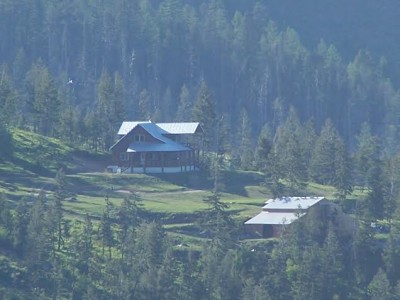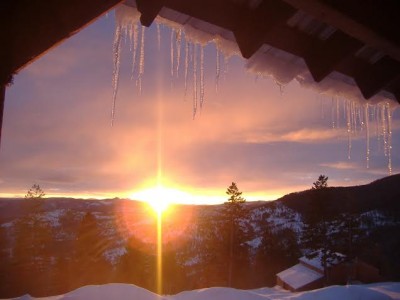 Living Off The Grid or OTG – what does it mean? Well, apparently it means very different things to different people. When I tell people we live ‘off grid’ I get a variety of interesting comments, like, “WHY?” and “Cool!” and “In Montana? Are you crazy?” I also hear, “Isn’t that expensive?”, “Isn’t that really HARD?”, “Well! Glad to see somebody is doing their part to save our world’s natural resources!” and my favorite, “Are you like, hiding out or something?” So. Obviously there is some confusion out there as to what OTG really means and I feel it is my civic duty (or something) to clear up some of these misconceptions. I also write this In the (admirable) interest of helping others who have been curious about the life-style because they too would like to go ‘off grid’ one day and more importantly, so I won’t get any more snarky comments.
Living Off The Grid or OTG – what does it mean? Well, apparently it means very different things to different people. When I tell people we live ‘off grid’ I get a variety of interesting comments, like, “WHY?” and “Cool!” and “In Montana? Are you crazy?” I also hear, “Isn’t that expensive?”, “Isn’t that really HARD?”, “Well! Glad to see somebody is doing their part to save our world’s natural resources!” and my favorite, “Are you like, hiding out or something?” So. Obviously there is some confusion out there as to what OTG really means and I feel it is my civic duty (or something) to clear up some of these misconceptions. I also write this In the (admirable) interest of helping others who have been curious about the life-style because they too would like to go ‘off grid’ one day and more importantly, so I won’t get any more snarky comments.
First of all, let’s talk about some different definitions of off grid, off the grid and OTG. It will be quick and painless, I promise. OTG, in a nutshell, refers to a home that is not connected to or dependent on any public utilities, such as the main or national electrical power grid, municipal water supply, sewer or natural gas. These homes are autonomous, living in a self-sufficient manner. The reasons for living off grid are varied and many but a few are: for altruistic environmental reasons, financial reasons (where the cost of outside utilities is prohibitive) or ‘distance-challenged’ issues (where public utilities are such a distance away as to be impractical). Some OTGers are off the grid because they have turned their backs on consumerism, do not want to be ‘recorded’ or traceable through ordinary means, or are not on a social networking site such as Facebook or Twitter (gasp!). These particular people are considered to be ‘off the grid’ and are not who we’re talking about, because they’re a little scary. (Ha HA! Just kidding! All OTG’ers are a LOVELY group of people.)
 On this beautiful mountain of ours we have around 13 families who are off grid. The way we all live off grid ranges from campers to one-room houses with lofts, from cozy log cabins to mobile homes, from (and I say this nicely) ‘shotgun shacks’ to 2500 square foot, hard-to-heat, houses.
On this beautiful mountain of ours we have around 13 families who are off grid. The way we all live off grid ranges from campers to one-room houses with lofts, from cozy log cabins to mobile homes, from (and I say this nicely) ‘shotgun shacks’ to 2500 square foot, hard-to-heat, houses.
There is no one way or right way to live off grid. Most of us use wood heat but some use propane. Some have propane refrigerators, others have electric. A few use solar panels for electricity but most use generators. Only one of us has a wind turbine (which is pretty much just a tacky yard ornament). A lot of people up here have actual water running into their homes while a few of us unlucky ones have to go get our water each week, either from a spring or from town. Common denominator? Batteries. We all use batteries for our power even though we charge them in different ways. Other common denominators – hard work, no power bills or water bills, peace and quiet, an excellent sense of community and generosity towards each other, living close to nature, freedom and I would also say true contentment. Living off grid is cheaper, simpler, more self-sufficient, less dependent, very satisfying. I am here to tell you that it does NOT have to be expensive. It is not too hard. It IS cool. It is nice to be doing our part to help the environment. And it’s not crazy, even in Montana.
(Written by and photos courtesy of Penny Diddwiddie)